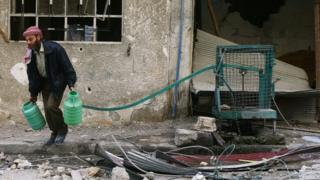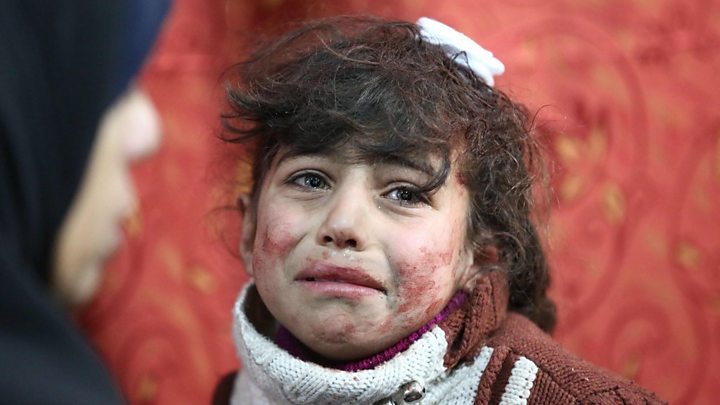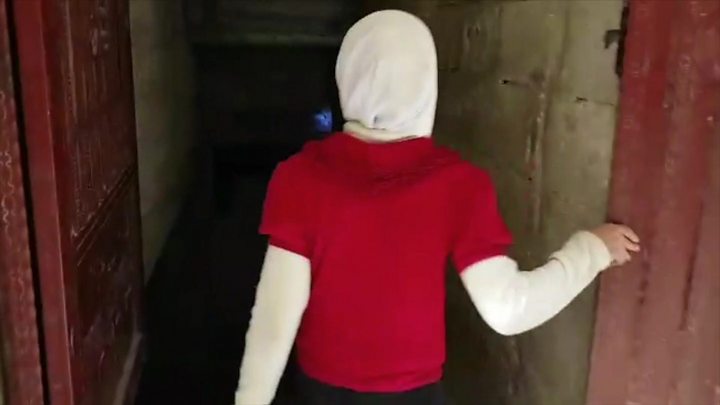 Image copyright
Image copyright
Reuters
More than 560 people have been killed in the enclave in the past eight days, monitors say
A five-hour pause in the Syrian government’s assault on the rebel-held area of Eastern Ghouta near Damascus has now begun.
The respite was ordered by Syria’s ally Russia, which said it would be repeated daily to allow civilians to leave.
It is not clear if aid agencies will be able to bring food and medicine into the area, where around 400,000 people have been under relentless bombardment.
The US has urged Russia to use its influence to secure a 30-day ceasefire.
That ceasefire was agreed in a UN Security Council resolution passed last Saturday, but it was not given a specific start date.
The Syrian Observatory for Human Rights (SOHR), a UK-based monitoring group, said the overnight situation in the Eastern Ghouta had been relatively calm, though the town of Douma had been hit by four rockets in the morning.
More than 560 people have been killed in the enclave in the past eight days, monitors say.
- Life in Eastern Ghouta – read residents’ stories
- Syria conflict: Will powers end up in direct war?
- Why is there a war in Syria?
Russia has said the pause will run from 09:00 until 14:00 local time (07:00-12:00 GMT) daily.
The Syrian Red Crescent is to help set up a corridor and people will be informed about it via leaflets, text messages and videos, Russia said.
Buses and ambulances will be waiting at a crossing to evacuate the sick and wounded.

“Five hours is better than no hours, but we would like to see an end to all hostilities extended by 30 days, as stipulated by the Security Council,” UN spokesman Stephane Dujarric told AFP news agency.
Is this the same as the UN’s truce call?
No. The Security Council resolution demanded that “all parties cease hostilities without delay for at least 30 consecutive days” to allow humanitarian aid deliveries and medical evacuations of critically ill people.
UN Secretary-General Antonio Guterres said on Monday that the resolution needed to be implemented immediately, warning: “Eastern Ghouta cannot wait. It’s high time to stop this hell on Earth.”
But Russian Foreign Minister Sergei Lavrov told reporters that the UN-mandated truce would “start when all sides of the conflict agree on how to introduce it”.
The jihadist groups Islamic State (IS) and al-Qaeda are excluded, as well as the major Islamist rebel factions Ahrar al-Sham and Jaysh al-Islam.
Mr Lavrov called them “partners of al-Nusra Front” – the name of a former al-Qaeda affiliate whose latest incarnation is an alliance of jihadists called Hayat Tahrir al-Sham (HTS). It has a small presence in the Eastern Ghouta.
What is the significance of Russia’s move?
By Jeremy Bowen, Middle East editor, BBC News
If it works, President Putin’s announcement of a daily humanitarian truce is the best news the hard-pressed people in the Eastern Ghouta have had since the bombardment intensified more than a week ago. However, it is not the full implementation of the UN Security Council resolution.
That resolution was weakened by the compromises necessary to stop it being vetoed by the Russians, who are Syrian President Assad’s most essential allies.
No start date was agreed for the ceasefire demanded by the resolution. Instead, it used the wording “without delay”. That leaves a lot of scope for Russia to impose conditions to buy more time for attacks on armed opposition groups.
Operations against the jihadists of IS and al-Qaeda are excluded from the resolution. But Moscow also says it will continue to hit Jaysh al-Islam. It is by far the most powerful opposition group in the Eastern Ghouta, is backed by Saudi Arabia, and has been to the Geneva peace talks. Jaysh al-Islam has accepted the ceasefire, while reserving the right of self-defence.
Russia and the Syrian government regard all the opposition groups as terrorists.
What is happening in the Eastern Ghouta?
The SOHR says 36 people have been killed in the enclave since the UN resolution was passed at the weekend.
On Monday, 22 people were killed in air and artillery strikes on Douma and Harasta, it reported.

The Syria Civil Defence, a rescue organisation whose volunteers operate in rebel-held areas, said nine civilians had been killed in a strike on one building in Douma.
Government health official Zaher Hajjo told Reuters news agency that rebel shellfire had caused 36 deaths and a number of injuries in the past four days.
Syria conflict: Eastern Ghouta ‘humanitarian pause’ begins}

